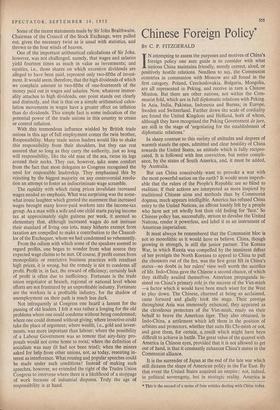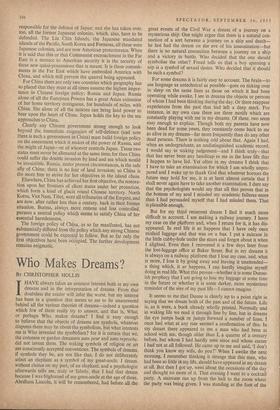Chinese Foreign Policy*
BY C. P. FITZGERALD IN attempting to assess the purposes and motives of China's foreign policy one sure guide is to consider with what nations China maintains friendly, merely correct, aloof, or positively hostile relations. Needless to say, the Communist countries in communion with Moscow are all found in the first category. Poland, Czechoslovakia, Bulgaria, Mongolia, are all represented in Peking, and receive in turn a Chinese Mission. But there are other nations, not within the Com- munist fold, which are in full diplomatic relations with Peking. In Asia, India, Pakistan, Indonesia and Burma; in Europe, Sweden and Switzerland. Farther down the scale of cordiality are found the United Kingdom and Holland, both of whom, although they have recognised the Peking Government de jure, are still in the stage of 'negotiating for the establishment of diplomatic relations.'
In sharp contrast to this variety of attitudes and degrees of warmth stands the open, admitted and clear hostility of China towards the United States, an attitude which is fully recipro- cated. It is followed with less conviction, but entire compli- ance, by the states of South America, and, it must be added, by Australia.
But can China conceivably want to provoke a war with the most powerful nation on the earth? It would seem improb- able that the rulers of the People's Republic are so blind to realities; if their actions are interpreted as more inspired by traditional Chinese aims and methods than by Communist dogmas, much appears intelligible. America has refused China entry to the United Nations, an affront keenly felt by a people who have not yet wholly lost their old feeling for 'face.' So Chinese policy has, successfully, striven to devalue the United Nations, render it powerless, and label it as an instrument of American imperialism.
It must always be remembered that the Communist bloc is not so monolithic as it would have us believe. China, though growing in strength, is still the junior partner. The Korean War, in which Russia was compelled by the imminent defeat of her prot6g6s the North Koreans to appeal to China to pull the chestnuts out of the fire, was the first great lift in China's status—no doubt in her rulers' view well worth the sacrifice of life. Indo-China gave the Chinese a second chance, of which they skilfully availed themselves. American propaganda in- sisted on China's primary role in the success of the Viet-minh —a factor which it would have been much wiser for the West to play down. The Chinese, charmed at being so acclaimed, came forward and gladly took the stage. Their prestige throughout Asia was immensely enhanced, they appeared as the chivalrous protectors of the Viet-minh, ready on their behalf to brave the American tiger. They also obtained, in Indo-China, a settlement which left them in the position of arbiters and protectors, whether that suits Ho Chi-minh or not, and gave them, for certain, a result which might have been difficult to achieve in battle. The great value of the quarrel with America in Chinese eyes, provided that it is not allowed to get out of hand, is that it constantly enhances China's status in the Communist alliance.
It is the surrender of Japan at the end of the late war which still dictates the shape of American polity in the Far East. By that event the United States acquired an empire : not, indeed, in political sovereignty, but in strategic reality. America is
• This is the second of a series of four articles dealing with China today.
responsible for the defence of Japan; and she has taken over, too, all the former Japanese colonies, which, also, have to be defended. The Liu Chiu Islands, the Japanese mandated islands of the Pacific, South Korea and Formosa, all these were Japanese colonies, and are now American protectorates. When it is said that this or that Communist encroachment in the Far East is a menace to American security it is the security of these new quasi-possessions that is meant. It is these commit- ments in the Far East which have embroiled America with China, and which still prevent the quarrel being appeased.
For China there are only two countries which geography has so placed that they must at all times assume the highest impor- tance in Chinese foreign policy; Russia and Japan. Russia alone of all the European Powers has a great Asian extension of her home territory contiguous, for hundreds of miles, with China. She alone of all the nations can bring land power to bear upon the heart of China. Japan holds the key to the sea approaches to China.
Clearly any Chinese government strong enough to look beyond the immediate exigencies of self-defence (and now there is such a government in China) must build foreign policy on the assessment which it makes of the power of Russia, and the might of Japan—or of whoever controls Japan. These two states must never be alienated at the same time, for then China could suffer the double invasion by land and sea which would be irresistible. Russia, under present circumstances, is the safe ally of China; there is no fear of land invasion; so China is the more free to strive for her objectives in the island chain.
Elsewhere, China has achieved her first objective, the restora- tion upon her frontiers of client states under her protection, which form a kind of glacis round Chinese territory. North Korea, Viet Nam, Tibet, were all tributaries of the Empire, and are now, after rather less than a century, back in their former situation. Burma, always more remote and less controlled, pursues a neutral policy which seems to satisfy China of her essential harmlessness.
The foreign policy of China, as so far manifested, has not substantially differed from the policy which any strong Chinese government could be expected to follow. But so far only the first objectives have been occupied. The further development remains enigmatic.



































 Previous page
Previous page